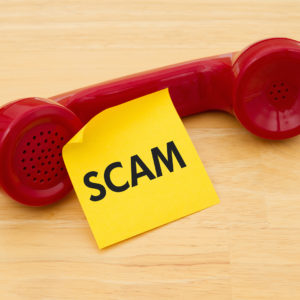Would you know how to recognize an impostor utility scam? If you were the victim of a scam, would you know what to do or whom to call?
National Utility Scam Awareness Day on November 15 aims to inform and empower consumers to prevent criminals, who pretend to work for their electric, natural gas or water company from gaining access to their money, property or personal information.
Anybody can be a target of a scam. Scammers tend to aim their efforts at our more vulnerable populations, including lower-income households and elderly individuals and communities.
How do you identify an impostor utility scam? There are a few common tactics that scammers tend to use, which includes phone, in-person and internet. Claiming to represent your utility company, scammers might call you on the phone threatening to shut off service, email or text you requesting financial or personal information, or the scammer might knock on your door requiring payment for an unnecessary service or entry to check an in-home utility device. These tactics are often aimed at stealing your money, using your personal information to commit identity theft, or robbing your home or business.
Scammers now use technology to their advantage, including caller identification and email address spoofing, to make you believe you are actually communicating with someone from your utility company. I have come across numerous stories of scammers faking their caller ID so that it appears to be a call from the victim’s utility company and sending emails copying the utility company’s logo, format and website link. They have also perfected replicating utility company identification badges and uniforms.
Another method from their criminal playbook is to call you and demand immediate payment, typically by a prepaid card bought at a nearby retail store, to prevent your electricity, natural gas, or water from being shut off in the next 30 minutes. They often take a hostile tone and become increasingly agitated if you ask questions or offer to call your utility to confirm your account information.
There are some simple steps you can take to make sure criminals do not succeed in taking your money, belongings or personal information. Never buy a prepaid card with the sole purpose of using it to pay your utility company. Utility companies will send you several advance notices, typically by U.S. mail, accept multiple forms of payment to settle your bill, and never shut off your service immediately if your bill is delinquent. Also, never pay a utility company to reconnect your service after an extreme weather event as they will typically do this for no cost; however, there may be a fee charged to reconnect your service after a disconnection for non-payment.
Never let someone claiming to be a representative of a utility company into your home without insisting on seeing their identification and verifying their appointment with your utility. Unless you have placed a service call, typically, a utility company will not come to repair, check or install something in or around your home or business without contacting you in advance. When in doubt, call your utility company at the number on your monthly bill or the utility company’s website — not a number provided by someone claiming to be with your utility.
Last, if you are ever asked to apply for a job either in person or via email from a utility company, make sure you verify the job opportunity with the utility company. Never fill out an “application” with your personal information without making sure the open position is legitimate.
If you think you have been the target of an impostor utility scam, contact your utility company. Information you provide them is invaluable as it helps keep them up-to-date on the latest tactics scammers are using and provides them information they may share with law enforcement and other partners in helping shut down scams.
Utility scams are on the rise and detrimentally affecting all of our communities nationwide. To spread awareness of these crimes and tips to avoid them, I partnered with Utilities United Against Scams, a coalition of more than 100 electric, natural gas and water utility companies across the United States and Canada, to author a guide (“Consumer’s Guide to Impostor Utility Scams”), which provides information on the types of common scams, tips to avoid them and contacts for scam victims to call.
I hope you will share this guide with your family, friends, neighbors and co-workers to help educate and share information on impostor utility scams. Together, we can work to raise awareness and help prevent utility scams, not just on Utility Scam Awareness Day, but every day.

